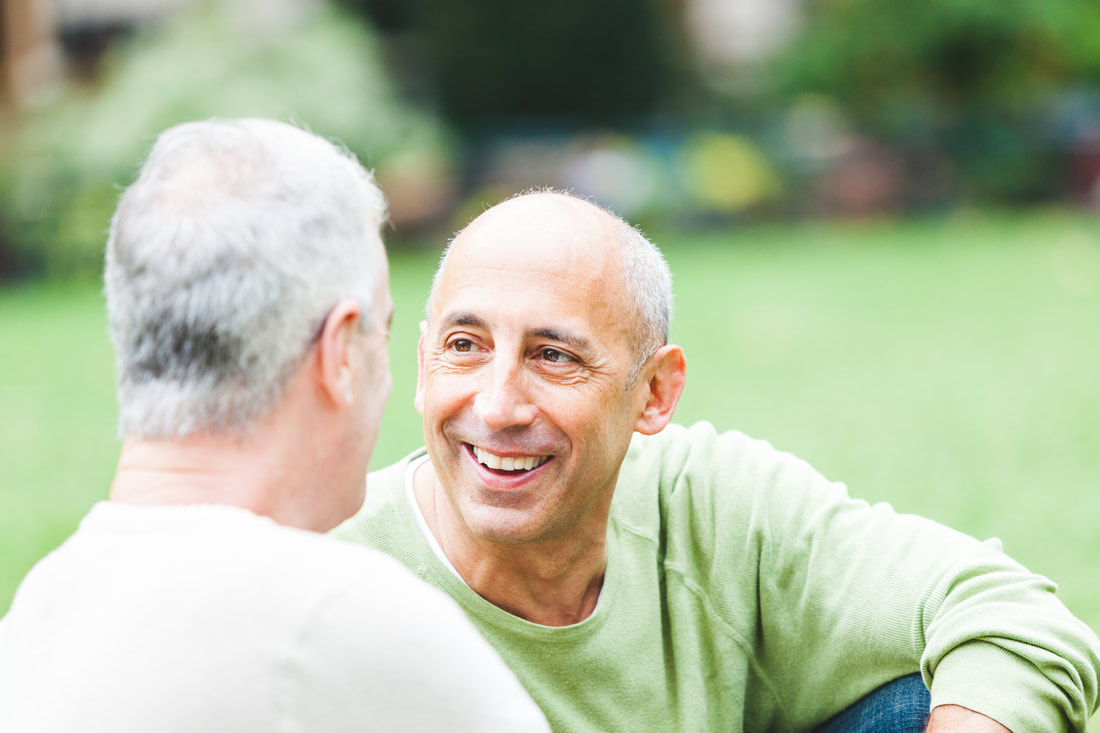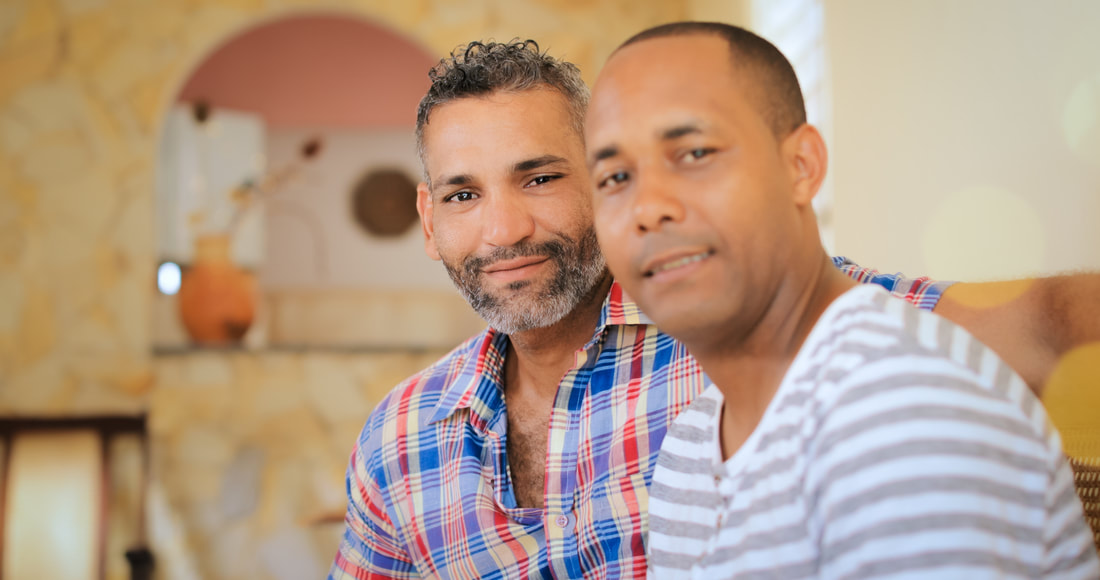Societal disapproval of age-disparate relationshipsImagine a gay couple whose age difference is greater than 10 years. What’s your first un-censored response when you imagine them? Do you judge, cringe, or assume what’s going on between them? Are you in a relationship with a much older/younger person but still have internalized shame about this? In dismantling our own prejudices it’s useful to be mindful and non-judgmental with our own spontaneous reactions. We exist in a society, where higher value is placed on being youthful, heterosexual, white, male, masculine, wealthy, beautiful, able-bodied, and various other attributes often not in our control. It’s impossible not to be impacted by this hierarchical oppressive system regardless of whatever privileged identities we may have. These external messages and subsequent societal stigmas get internalized and can begin operating without our conscious awareness. Allowing enough ongoing space to see our own prejudices, replacing judgment with curiosity and compassion, is an essential aspect to transforming these automatic beliefs. With this increased awareness we can take different supportive actions and be good allies for other causes because in the end it’s true, we’re not free until all of us are free. We need to work together to dismantle all systems of oppression, not just homophobia and heterosexism. We need to become a more compassionate and supportive community. Having said this, intergenerational relationships have existed throughout history in various forms. Straight people have them. Lesbian, gay, bisexual, transgender, and queer people have them. However, gay men bear particular layers of contempt for having them because it triggers the demeaning stereotypes that gay men either recruit children or are predatory child molesters, even though research clearly shows that gay men are no more likely to do so than their straight counterparts. Bigotry Begets BigotryCommon negative stereotypes for younger gay adults in age-gap relationships include that they: have daddy issues, are subservient, needy, poor, flaky, immature and in it for the money and/or status gains. Conversely, negative stereotypes for those who are older include that they: are immature, cradle-robbers, perverse, dominant/controlling, paying for it, manipulative and jaded. These stereotypes, like most do, provide a black/white and simplistic justification for judging others. It puts each person in an age-disparate relationship into categories that are two-dimensional and easily ridiculed, regardless of their actual accuracy. As gay men, we have been the recipients of such devaluation and can end up doing this to others who are dissimilar to ourselves. Unfortunately, sometimes bigotry begets bigotry as we attempt to redirect prejudices laid at our doorstep onto others. Healing and growing as a community requires us to acknowledge this and work to eradicate ALL forms of oppression, ageism and adultism included. As a beginning psychotherapist, 18 years ago, my first internship was working with older adults, some of whom were LGBTQ in their 70’s and 80’s. Shortly thereafter I provided counseling to LGBTQ youth for several years. I’ve had the unique experience of working with clients from ages 12 to 87 and have learned first-hand the value that those who have lived any number of years can bring to society at large, let alone to relationships. Imagine what it would be like if we all operated from the perspective and felt experience that everyone has inherent value and everyone contributes in various ways? How might this change our views toward intergenerational intimate adult relationships? More positive stereotypes and yet still a two-dimensional perspective about younger adults would highlight that they contribute a fresh/newer perspective on issues, have increased energy, curiosity, playfulness and passion for life while middle-aged and older adults may more frequently provide support, mentorship, history, groundedness, security and protection. In reality we are all a lot more three-dimensional than this. For example, a younger adult guy might have a higher income, less of a libido, more stability and more emotional depth than his older partner. An older guy might be full of life, energy and passion than his younger partner. Even if there are certain qualities that fall neatly into a stereotypical box, this doesn’t mean that all other qualities do or that there is something automatically unhealthy about this dynamic if it does. It might work very well or good enough for their relationship depending on the circumstances and it also might evolve over time. Good CommunicationRelationships work best when all parties involved share core values, not identical ages. Helpful core values can include loyalty, dependability, kindness/compassion, and commitment to a relationship. We all have the need for sharing experiences with someone who has similar interests/experiences and importing/exporting these with someone who is dissimilar. Often, whichever of these needs are primarily met in an intimate relationship, the other needs are met in other relationships. Those in age-disparate relationships might have more things in common than differences, even if they grew up in different generational circumstances. Another quality essential for all relationships, regardless of age, is the ability to communicate our needs, have conflict and resolve conflict adequately. Conflict can be more frequent for those in different/complimentary relationships than those in similar/symmetrical relationships but this isn’t a problem in and of itself. Highly conflictual couples often have greater intensity, passion and a felt sense of intimacy while low conflict couples can have greater stability, calm and a felt sense of companionship. Practicing good communication, asserting needs and resolving conflict can deepen intimacy and are the skills required for an LTR, whatever the ages of those in a relationship. Take a moment to reflect on that couple you imagined in the beginning of this article. Have your feelings shifted at all? If so, in what way? How can you be a good ally to them? Tips to Combat Societal StigmaLastly, how do those in age-discrepant relationships fend off societal stigma about their age differences?
This article was first published in The FIGHT Magazine, August 2015: http://thefightmag.com/2015/08/harold-and-claude/
2 Comments
Steven
4/16/2021 11:49:49 pm
I do not see what the difference in age has to do with it, as long as they love each other that is what counts .I am a sixty year old bisexual male who has always been attracted to older white males 10 to 20 years older then me.I do like some men younger then me but I prefer older men not just for sex but for maturity ,a long term relationship and possibly a husband.it is not just about the sex it is about love friendship and trust.I love this article for showing that no matter what the age difference as long as they are happy that is what counts.hopefully I could find someone to spent the rest of my life with thank you for this article.
Reply
Leave a Reply. |
Categories
All
Archives
March 2022
�
|


 RSS Feed
RSS Feed